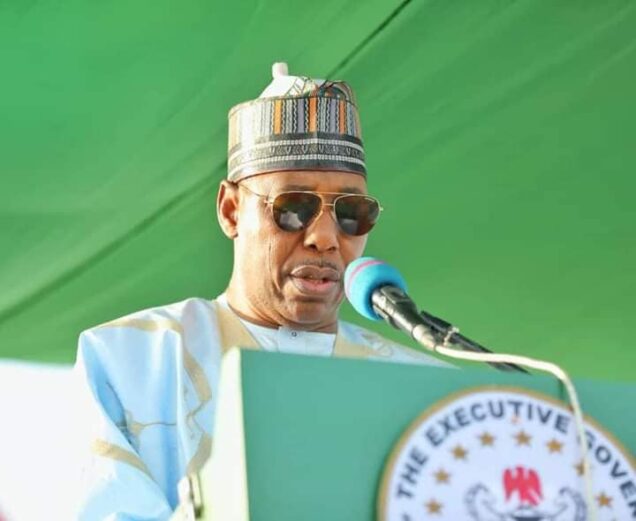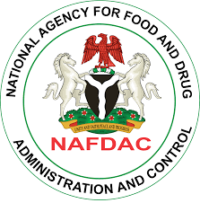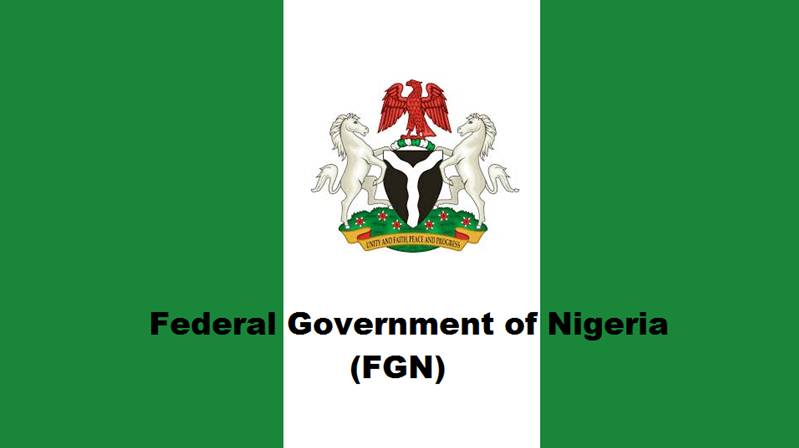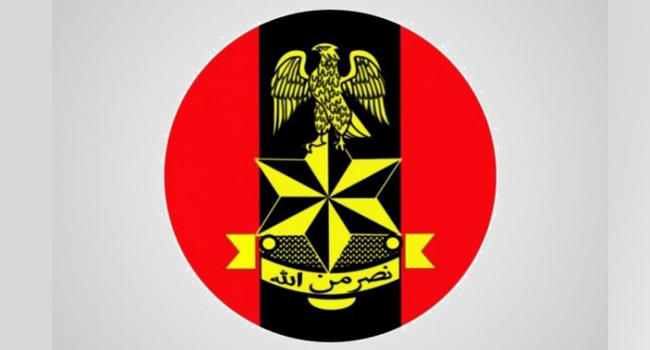Headlines
Nigeria on alert mode as Ebola resurfaces in Uganda – NCDC
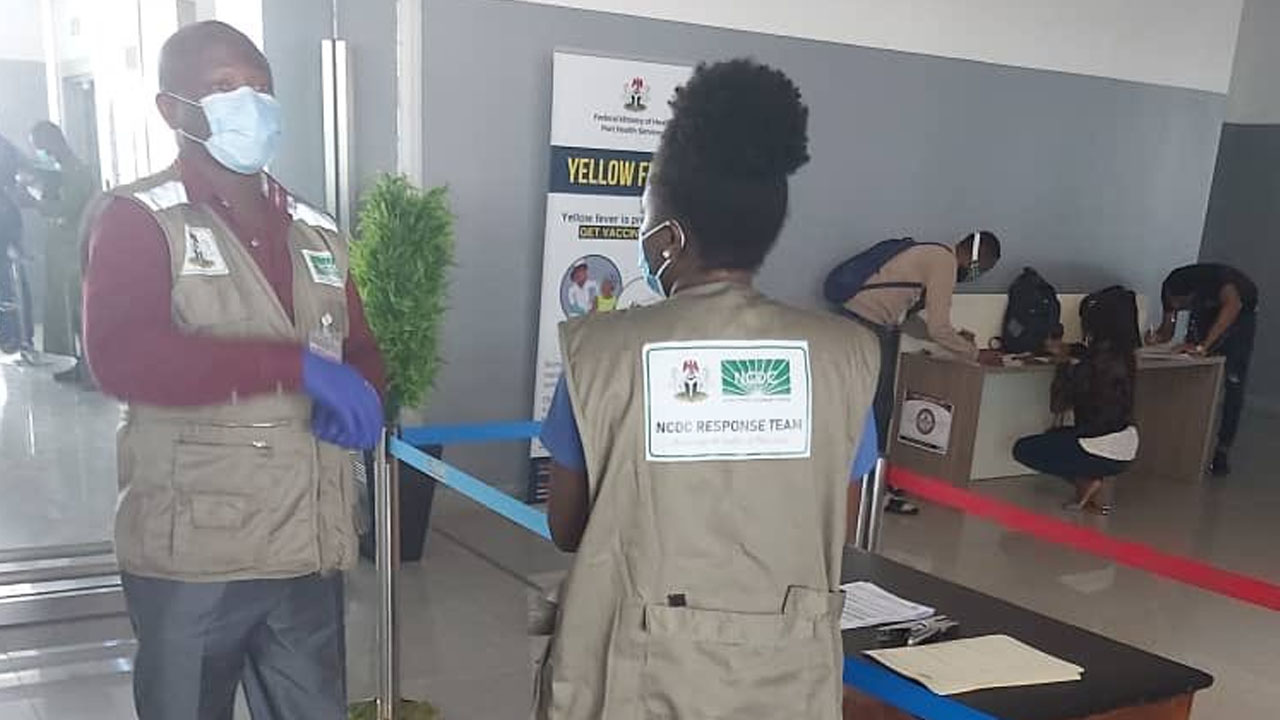
The Nigeria Centre for Disease Control and Prevention (NCDC) says it is aware of the ongoing outbreak of Ebola Virus Disease (EVD) caused by the Sudan strain of the Ebola Virus (EV) in Uganda.
The Director-General, NCDC, Dr Ifedayo Adetifa, in a statement on Tuesday made available to the News Agency of Nigeria (NAN) in Abuja, said that Uganda had, on Sept. 20, declared the outbreak of the virus and that it was on an alert mode.
NAN reports that the outbreak has also been confirmed by the World Health Organization (WHO).
The Sudan strain of the Ebola virus is the known cause of EVD, having caused previous outbreaks in Uganda, South Sudan, and the Democratic Republic of Congo.
The Uganda Virus Research Institute confirmed the virus in samples collected from a 24-year-old male, who had exhibited symptoms of the disease and later died in Mubende District in the Central Region, about 175km from the capital, Kampala.
As of Sept. 29, the Ugandan Ministry of Health reported 54 cases (35 confirmed and 19 probable) and 25 deaths (7 confirmed and 18 probable).
The Ugandan Ministry of Health, with the support of WHO, is working to effectively respond to and contain the spread of the virus.
The NCDC boss said that the agency’s -led multisectoral National Emerging Viral Haemorrhagic Diseases Technical Working Group (NEVHD TWG), working with partners and stakeholders, had conducted a rapid risk assessment to guide in-country preparedness activities.
“The NEVHD TWG coordinates preparedness efforts for EVD and other emerging viral haemorrhagic diseases.
“Based on available data, the overall risk of importation of the Ebola virus and the impact on the health of Nigerians has been assessed as high for the following reasons:
“The Sudan Ebola Virus does not currently have an effective drug for treatment or licensed vaccine for prevention.
“The extent of the outbreak in Uganda has not yet been ascertained as investigations have shown that some persons may have died with similar symptoms which were not reported to health authorities.
“In addition, their burials were not conducted safely to prevent transmission.
“The case fatality rate of the Sudan virus varied from 41 per cent to 100 per cent in past outbreaks.
“The likelihood of importation to Nigeria is high, due to the increased air travel between Nigeria and Uganda, especially through Kenya’s Nairobi airport, a regional transport hub, and other neighbouring countries that shared a direct border with Uganda.
“The likelihood of spread in Nigeria following importation is high due to the gatherings and travel associated with politics, the coming yuletide as well as other religious gatherings and festivals during the last few months of the year,” he outlined.
He said that in spite of the risk assessment, the country had the capacity – technical, human (health workforce), and diagnostic – to respond effectively in the event of an outbreak.
“This is exemplified by our successful response to the Ebola outbreak in 2014, as well as improvements in our capacity for health emergency response during the COVID-19 pandemic.
“We have the diagnostic capacity to test for the EVD presently at the National Reference Laboratory in Abuja and the Lagos University Teaching Hospital’s Centre for Human and Zoonotic Virology Laboratory,” he said.
He, however, said that diagnostic capacity would be scaled up to other laboratories in cities with important Points of Entry (POE) and others as might be required.
“An effective response system is in place with the availability of control capacities (trained rapid response teams, and an effective infection prevention and control programme) to limit the risk of spread in the event of a single imported case.
“Currently, no case of EVD has been reported in Nigeria. Nonetheless, the Nigerian Government, through NCDC’s multisectoral NEVHD TWG, has put several measures in place to prevent and prepare for immediate control of any outbreak of the disease in-country.
“The NCDC Incident Coordination Centre (ICC) is now in alert mode. Development of an incident action plan for the first few cases of EVD has commenced.
“POE surveillance has been heightened, using the passenger pre-boarding health declaration and screening form in the Nigeria International Travel Portal (NITP) platform.
“Passengers arriving from Uganda and persons who transited in Uganda are being followed up for 21 days of their arrival in Nigeria on their health status.
“Trained Rapid Response Teams are on standby to be deployed in the event of an outbreak.
Public Health Emergency Operations Centres (PHEOCs) in states with major POE i.e. Lagos, Kano, Abuja, and Rivers are on standby.
“A medical countermeasures plan is available.”
He said amplification of risk communication and engagement with states and partners, to strengthen preparedness activities including a review of risk communication protocols, plans and messages in the event of an outbreak, had been done.
Adetifa said the country had an active infection Prevention and Control (IPC) programme nationwide with guidelines and training packages developed for healthcare workers.
NAN reports that the Ebola virus disease is a severe, often fatal illness affecting humans.
The strain responsible for the current outbreak was first reported in southern Sudan in June 1976.
Since then, seven outbreaks caused by this strain had been reported (four in Uganda and three in Sudan) with previous outbreaks’ fatality ratio ranging from 41 to 100 per cent.
Just like other types of Ebola virus, people infected cannot spread the disease until the development of symptoms, including fever, fatigue, muscle pain, headache, and sore throat later followed by vomiting, diarrhoea, rash, and symptoms of impaired kidney and liver function.
Symptoms may appear anywhere from two to 21 days after exposure to the virus, but the average is 8 to 10 days.
Currently, there are no vaccines or therapeutics for the prevention and treatment of this strain of the virus.
However, the early initiation of supportive treatment has been shown to significantly reduce deaths.
Recovery from EVD depends on good supportive clinical care, management of co-morbidities, and the patient’s immune response.
People who recover from Ebola virus infection develop antibodies that last for at least 10 years.
Headlines
Noble Ladies Champion Women’s Financial Independence at Grand Inauguration in Abuja

Women from diverse backgrounds across Nigeria and beyond gathered at the Art and Culture Auditorium, Abuja, for the inauguration and convention of the Noble Ladies Association. The event, led by the association’s Founder and “visionary and polished Queen Mother,” Mrs. Margaret Chigozie Mkpuma, was a colourful display of feminine elegance, empowerment, and ambition.
The highly anticipated gathering, attended by over 700 members and counting, reflected the association’s mission to help women realise their potential while shifting mindsets away from dependency and over-glamorization of the ‘white collar job.’ According to the group, progress can be better achieved through innovation and creativity. “When a woman is able to earn and blossom on her own she has no reason to look at herself as a second fiddle,” the association stated.
One of the association’s standout initiatives is its women-only investment platform, which currently offers a minimum entry of ₦100,000 with a return of ₦130,000 over 30 days—an interest rate of 30 percent. Some members invest as much as ₦1 million, enjoying the same return rate. Mrs. Mkpuma explained that the scheme focuses on women because “women bear the greater brunt of poverty” and the platform seeks “to offer equity in the absence of economic equality.”
Education is also central to the Noble Ladies’ mission, regardless of age. Their mantra, “start again from where you stopped,” encourages women to return to school or upgrade their skills at any stage in life. The association believes that financial stability is vital in protecting women from cultural practices that dispossess widows of their late husbands’ assets, while also enabling them to raise morally and socially grounded families.
Founded on the vision of enhancing women’s skills and achieving financial stability, the association rests on a value system that discourages pity and promotes purpose. “You have a purpose and you build on that purpose to achieve great potentials and emancipation,” Mrs. Mkpuma said.
A criminologist by training and entrepreneur by practice, she cautions against idleness while waiting for formal employment. “There are billions in the informal and non-formal sectors waiting to be made,” she said, rejecting the “new normal of begging” and urging people to “be more introspective to find their purpose in life and hold on to it.”
Mrs. Mkpuma’s management style keeps members actively engaged, focusing on vocational skills and training to prepare them for competitive markets. She is exploring “innovative integration of uncommon technologies” and is already in talks with international franchises to invest in Nigeria, with Noble Ladies as first beneficiaries.
The association’s core values include mutual respect, innovation, forward-thinking, equal opportunity, and financial emancipation. With plans underway to establish a secretariat in the heart of Abuja, the group aims to expand its impact.
The event drew high-profile guests, including former Inspector General of Police, Mike Okiro, and a host of VIPs, marking a significant milestone in the association’s drive for women’s empowerment.
Headlines
NEPZA, FCT agree to create world-class FTZ environment

The Nigeria Export Processing Zones Authority (NEPZA) has stepped in to resolve the dispute between the Federal Capital Territory Administration and the Abuja Technology Village (ATV), a licensed Free Trade Zone, over the potential revocation of the zone’s land title.
Dr. Olufemi Ogunyemi, the Managing Director of NEPZA, urged ATV operators and investors to withdraw the lawsuit filed against the FCT administration immediately to facilitate a roundtable negotiation.
Dr. Ogunyemi delivered the charge during a courtesy visit to the Minister of the Federal Capital Territory, Barrister Nyesom Wike, on Thursday in Abuja.
You will recall that the ATV operators responded to the revocation notice issued by the FCT administration with a lawsuit.
Dr. Ogunyemi stated that the continued support for the growth of the Free Trade Zones Scheme would benefit the nation’s economy and the FCT’s development, emphasizing that the FCT administration recognized the scheme’s potential to accelerate industrialisation.
Dr. Ogunyemi, also the Chief Executive Officer of NEPZA, expressed his delight at the steps taken by the FCT minister to expand the economic frontier of the FCT through the proposed Abuja City Walk (ACW) project.
Dr. Ogunyemi further explained that the Authority was preparing to assess all the 63 licensed Free Trade Zones across the country with the view to vetting their functionality and contributions to the nation’s Foreign Direct Investment and export drives.
“I have come to discuss with His Excellency, the Minister of the Federal Capital Territory on the importance of supporting the ATV to succeed while also promoting the development of the Abuja City Walk project. We must work together to achieve this for the good of our nation,” he said.
On his part, the FCT Minister reiterated his unflinching determination to work towards President Bola Ahmed Tinubu’s Renewed Hope Agenda by bringing FDI to the FCT.
“We must fulfil Mr. President’s promises regarding industrialization, trade, and investment. In this context, the FCT will collaborate with NEPZA to review the future of ATV, a zone that was sponsored and supported by the FCT administration,” Wike said.
Barrister Wike also said that efforts were underway to fast-track the industrialisation process of the territory with the construction of the Abuja City Walk.
The minister further said the Abuja City Walk project was planned to cover over 200 hectares in the Abuja Technology Village corridor along Airport Road.
According to him, the business ecosystem aimed to create a lively, mixed-use urban center with residential, commercial, retail, hospitality, medical, and institutional facilities.
He added that the ACW would turn out to be a high-definition and world-class project that would give this administration’s Renewed Hope Agenda true meaning in the North-Central Region of the country.
Barrister Wike also indicated his continued pursuit of land and property owners who failed to fulfil their obligations to the FCT in his determination to develop the territory.
Headlines
Benue IDPs block highway, demand return to ancestral homes

Vehicular movement along the Yelwata axis of the Benue–Nasarawa highway was brought to a standstill on Wednesday as Internally Displaced Persons, IDPs, staged a protest, demanding immediate return to their ancestral homes.
The protesters, believed to be victims of persistent attacks by suspected herdsmen, blocked both lanes of the busy highway for several hours, chanting “We want to go back home”.
The protest caused disruption, leaving hundreds of motorists and passengers stranded.
Eyewitnesses said the displaced persons, many of whom have spent years in overcrowded IDP camps, are expressing deep frustration over the government’s delay in restoring security to their communities.
“We have suffered enough. We want to return to our homes and farms,” one of the protesters told reporters at the scene.
Security personnel were reportedly deployed to monitor the situation and prevent any escalation, though tensions remained high as of press time.
Efforts to reach the Benue State Emergency Management Agency, SEMA, and other relevant authorities for comment were unsuccessful.
-

 Headlines4 years ago
Headlines4 years agoFacebook, Instagram Temporarily Allow Posts on Ukraine War Calling for Violence Against Invading Russians or Putin’s Death
-

 Headlines4 years ago
Headlines4 years agoNigeria, Other West African Countries Facing Worst Food Crisis in 10 Years, Aid Groups Say
-

 Foreign3 years ago
Foreign3 years agoNew York Consulate installs machines for 10-year passport
-

 News1 year ago
News1 year agoZero Trust Architecture in a Remote World: Securing the New Normal
-

 Entertainment3 years ago
Entertainment3 years agoPhyna emerges winner of Big Brother Naija Season 7
-

 Headlines1 year ago
Headlines1 year agoNigeria Customs modernisation project to check extortion of traders
-

 Entertainment2 years ago
Entertainment2 years agoMovie download platform, Netnaija, announces closure
-

 Economy2 years ago
Economy2 years agoWe generated N30.2 bn revenue in three months – Kano NCS Comptroller



